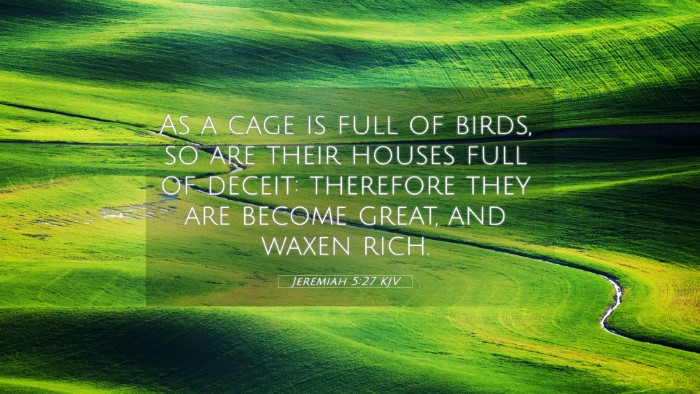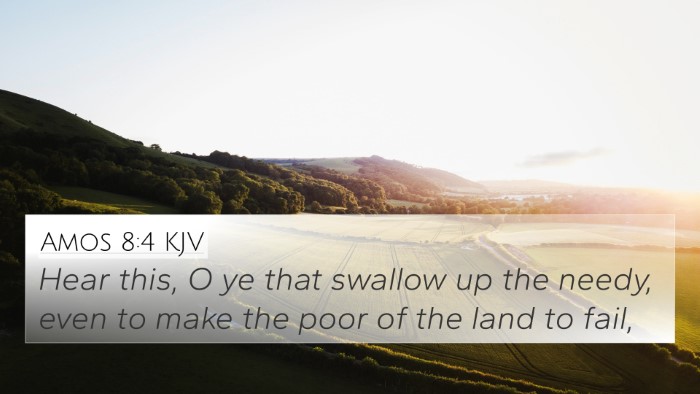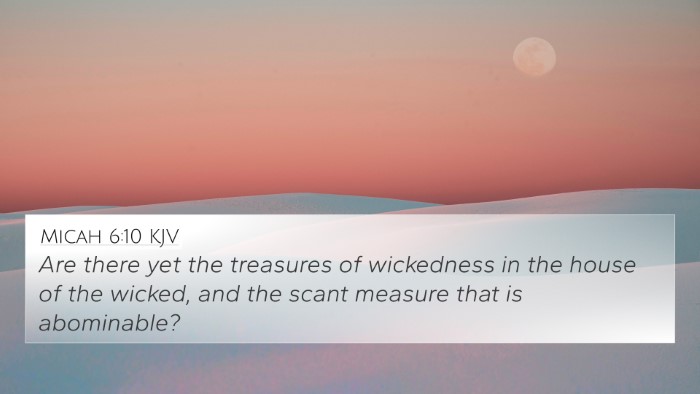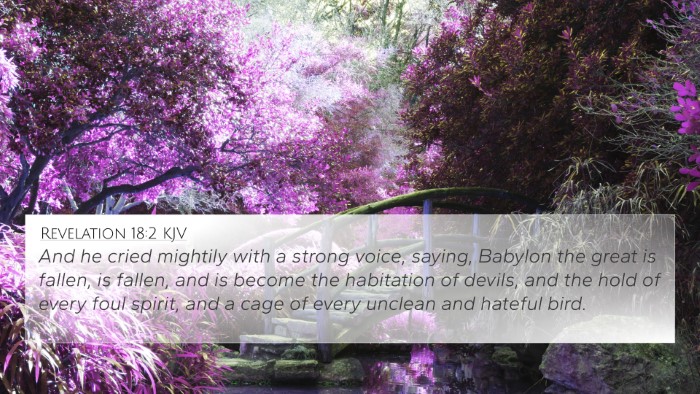Understanding Jeremiah 5:27
Jeremiah 5:27 states:
"As a cage is full of birds, so are their houses full of deceit: therefore they are become great, and waxen rich."
This verse unfolds the consequences of societal corruption and the moral degradation of the people of Judah during the time of the prophet Jeremiah.
Summary of Commentary Insights
Scholars like Matthew Henry, Albert Barnes, and Adam Clarke provide extensive commentary on this verse highlighting its themes of corruption, hypocrisy, and divine judgment.
Here, we examine key insights drawn from their collective interpretations.
Verse Meaning and Analysis
In this verse, the imagery of a cage filled with birds symbolizes the crowded homes of the people, which are teeming with deceitful practices. The "cage" reflects not only a place of confinement but also a false sense of security, as these homes are filled with wealth derived from wrongdoing.
- Deceitfulness of the Heart: The "deceit" mentioned here points to the corruption of moral values within the society. Matthew Henry notes that the people have become accustomed to dishonesty and trickery.
- Consequences of Sin: The phrase "become great" infers that their material wealth does not equate to spiritual prosperity. Albert Barnes emphasizes that wealth gained through deceit ultimately leads to ruin.
- False Security: Adam Clarke elaborates on the metaphor of the cage, suggesting that just as the birds are trapped yet seem safe, so too are the people trapped in their own sins, deluded by their riches.
Cross-References
To further enrich our understanding of Jeremiah 5:27, let’s explore several cross-referenced Biblical texts that illustrate the recurring themes of deceit, judgment, and societal corruption:
- Proverbs 28:20: "A faithful man shall abound with blessings: but he that maketh haste to be rich shall not be innocent."
- Isaiah 1:23: "Thy princes are rebellious, and companions of thieves: every one loveth gifts, and followeth after rewards: they judge not the fatherless, neither doth the cause of the widow come unto them."
- Micah 6:11: "Shall I count them pure with the wicked balances, and with the bag of deceitful weights?"
- Ezekiel 18:30: "Therefore I will judge you, O house of Israel, every one according to his ways, saith the Lord God. Repent, and turn yourselves from all your offenses; so sin will not be your downfall."
- James 5:1-3: "Go to now, ye rich men, weep and howl for your miseries that shall come upon you. Your riches are corrupted, and your garments are moth-eaten."
- Luke 16:13: "No servant can serve two masters: for either he will hate the one, and love the other; or else he will hold to the one, and despise the other. Ye cannot serve God and mammon."
- Romans 2:6-8: "Who will render to every man according to his deeds: To them who by patient continuance in well doing seek for glory and honour and immortality, eternal life: But unto them that are contentious, and do not obey the truth, but obey unrighteousness, indignation and wrath."
Thematic Connections
The themes explored in Jeremiah 5:27 resonate throughout Scripture, revealing a cohesive message regarding the relationship between wealth, morality, and divine judgment. The cross-references serve to illustrate:
- Wealth and Moral Failure: Many scriptures point out that the accumulation of wealth often leads to ethical compromises, as seen in Proverbs 28:20 and James 5:1-3.
- Judgment of the Wicked: There is an overarching narrative throughout the Bible that God will ultimately judge those who engage in deceit and corruption, echoing themes in Ezekiel 18:30 and Romans 2:6-8.
- Call to Repentance: The prophetic call to repentance is a central theme, emphasizing that even in the face of judgment, there is an opportunity for redemption, as seen in Ezekiel 18:30.
Practical Applications
Understanding the nuances of Jeremiah 5:27 can empower believers to critically engage with the moral dilemmas they face in contemporary society. Here are some practical applications:
- Self-Examination: Believers are encouraged to examine their own lives for areas where deceit may overshadow honesty.
- Advocating for Justice: Following the biblical call for justice for the fatherless and the widow (Isaiah 1:23), individuals should strive to support the oppressed and those unjustly treated.
- Understanding the Nature of True Wealth: The emphasis on spiritual over material wealth should inspire a pursuit of spiritual growth and service over the accumulation of riches.
Conclusion
Jeremiah 5:27 serves as a powerful reminder of the dangers of deceit and the false security derived from wealth. The insights from various public domain commentaries, supported by cross-references throughout the Bible, enrich our understanding of this important verse and its implications for both ancient and modern audiences.










